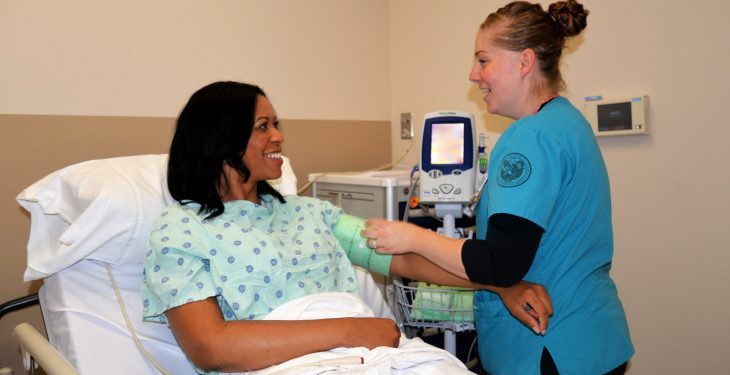Recently discharged military medics across the country now have the opportunity to seek comparable employment with VA, thanks to a program which aims to integrate them as clinical staff in VA’s emergency departments. The program’s mission is twofold — to develop a pipeline of well-trained clinical staff into the VA and to cultivate a career transition for former medics into civilian employment in the medical career field.
In 2011, VA introduced a pilot program to explore a potential career field in its medical centers, the Intermediate Care Technician (ICT). The idea sprang from the department’s desire to recruit former military medics and corpsmen to capitalize on their tremendous knowledge, skills and experience. Beyond active duty there are few, if any, equivalent civilian health care positions that allow these Veterans to utilize their training without additional academic preparation.

Kristina Snell is an ICT in the emergency department at the Louis Stokes Cleveland VA Medical Center.
Kristina Snell is an ICT in the emergency department at the Louis Stokes Cleveland VA Medical Center.
Snell served as an aerospace medevac technician in the Air Force with the 452nd Air Evacuation Medical Squadron. She said the transition from military to civilian life and civilian employment is stressful, and that many medics don’t feel like they have anything to show for their service and experience when they begin the search for a civilian job.
Three and a half years ago, Snell’s husband, a Marine, received an email from VA about recruitment for the ICT pilot program. The subject line read, “Attention Combat Medics, Med Techs & Corpsman, continue your medical career as a VA Intermediate Care Technician (ICT).” Snell applied, was accepted, and has worked for VA since.
Snell says that ICTs have special bonds with patients that civilian providers who aren’t Veterans don’t have.
“This job is really amazing, It provides security and income, stability, mentors a place to call home, it surrounds you with a community of people who understand you, who are there to help you and allow you to help other veterans,” said Snell.
VA began recruiting former military medics and corpsmen to fill these positions in 2012. The ICT role was designed to capitalize on the training and skills of the former medics and corpsmen to provide a higher level of clinical support to both nursing and medicine.
To test the feasibility of the new position, a one-year pilot program was implemented in 15 emergency departments, each with three ICTs. The pilot facilitated the hiring of former medics and corpsmen to fill the positions. VA received over 400 applications for 45 vacancies.
Throughout the pilot phase, VA completed proficiency and competency testing for ICTs in a variety of skills: taking vital signs; completing point-of-care testing including EKGs, rapid flu/strep, and urine testing; drawing blood samples; placing IVs, NG tubes and catheters; eye and ear irrigation; simple abscess incision and drainage; suturing, splinting and wound care.
ICT responsibilities range from expediting the flow and efficiency of fact track areas within the emergency department, rooming and prepping patients for evaluation, confirming that tests initiated in triage are completed, coordinating the patient to different venues and completing their discharge process.
Program administrators paid special attention to the impact ICTs had on patient care and satisfaction. The pilot demonstrated that the ICT role was a success. Pilot sites reported improved patient processing and increased productivity of emergency department staff as a whole. In addition, ICTs reported satisfaction and gratitude for the chance to use their knowledge and skills for Veteran care. Additionally, Veteran patients easily identified with and accepted the care provided by the ICTs.
Upon completion of the pilot program, facilities not included in the first phase expressed an interest in hiring ICTs. VA is now in the process of expanding the ICT role as a special classification. VA is also creating a career pathway for ICTs to attain licensed professional roles through advanced education, with the goal of long-term VA employment, supporting VA’s ongoing mission of providing quality care to Veterans.
For information about opportunities in the ICT career field, visit VA Careers. Read more about the ICT pilot program here.
Topics in this story
More Stories
Whether it’s access to the great outdoors or a calmer pace in your everyday life, you can find it in rural VA communities around the country.
The Medical Foster Home program offers Veterans an alternative to nursing homes.
Watch the Under Secretary for Health and a panel of experts discuss VA Health Connect tele-emergency care.







I always thought it was injustice to have navy
Corpmen only qualify to be nursing assistants in the civilian world. And I am not talking about the independent duty Corpmen( IDC) and those with high demand navy Enlisted classification (NEC). Having this ICT program in place is an added advantage and should be applauded. Hopefully it has Come to stay and the average Corpman has something to look forward to when they eventually transition out of the navy.
Great story. Thank you Ms. Heup.